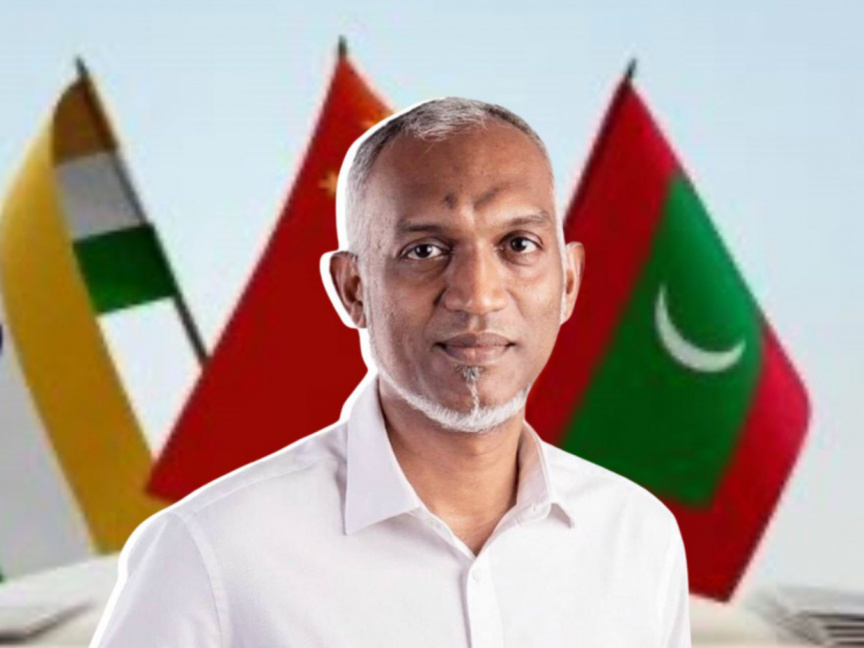
Pro-China candidate Muizzu wins Maldives presidential election.”
This was the headline carried by international news agencies after PPM-PNC’s candidate Dr. Mohamed Muizzu won the Maldives presidential election runoff on Saturday – beating MDP’s Ibrahim Mohamed Solih, the incumbent president, by a margin of eight percent.
The articles, with a reach of millions of readers, portrayed Muizzu as a “pro-China” leader.
The news agencies that carried the headline include BBC, CNN, The Guardian, Al Jazeera, Washington Post, and other top media giants.
The poll to elect the leader of Maldives for the next five years was described as a battle between India and China. Solih was labelled “pro-India”, while Muizzu was labelled “pro-China”.
The label on Muizzu stems from the close relations fostered between Maldives and China during the administration of PPM-PNC’s leader Abdulla Yameen Abdul Gayoom – who held office from 2013 to 2018. China funded several mega projects in Maldives during that time, including the Sinamale’ Bridge and the Hiyaa Housing Project. The loans were issued by Chinese banks, and the work was carried out by Chinese contractors.
Meanwhile, the MDP, since its first administration in 2018, has promoted itself in international media as a pro-India and “pro-western party. And its opposition, as pro-China.
The labels have stuck, since then.
MUIZZU CALLS HIMSELF ‘PRO-MALDIVES’
At his victory rally in Male’ City on Monday, Muizzu described the foreign policy of the incoming administration as “pro-Maldives.”
He said that he will foster relations with all countries that respect the policy.
President-elect Dr. Mohamed Muizzu addresses his victory rally in Male' City on October 3, 2023. (Sun Photo/Maahil Athif)
He did not go into much detail about the policy, but said that he hopes all countries will respect Maldives’ independence and sovereignty.
“I hope all countries will respect our autonomy, and accept that we have the right to protect our independence, the same as them,” he said.
Muizzu had built his presidential campaign on the assertion that there are foreign soldiers stationed in Maldives. He asked to be elected to expel the soldiers.
At Monday’s rally, Muizzu said foreign soldiers would be expelled in accordance with standard protocol.
“I am confident we can get it done. The people have decided they do not want the soldiers here. My message to the ambassadors who come to meet me is this: you can maintain relations with us on this basis,” he said.
Muizzu said that anything can be achieved through diplomacy, and promised to deliver what the people want.
SHIFT IN FOREIGN POLICY DATES BACK TO NASHEED
Maldives is far too small a country to be involved in the power struggle between India and China, and they vie for political and economic clout in the global arena.
But the country appears to have landed itself in the middle.
Its foreign policy is often described as the crowning glory of Maumoon Abdul Gayoom’s 30-year reign, during which time he focused more on maintaining his hold on power, than on bringing high-speed development. Fathuhulla Jameel fostered close ties with countries during his 27 years as foreign minister. The administration was careful not to get over-reliant on any single country, and promoted a balanced foreign policy. This prevented foreign interference in the country’s domestic affairs. Multiple countries invested millions on Maldives’ development. Maumoon had maintained the policy throughout his three-decade rule.
Former presidents Maumoon Abdul Gayoom (L) and Mohamed Nasheed (R). (Photo/V News)
Mohamed Nasheed, a social reformer and political activist with little experience in administration, led a movement which ended Maumoon’s reign in 2008. During his administration, Maldives abandoned its balanced foreign policy and shifted closer to India’s orbit.
Up until then, Maldives had never openly criticized another country. But Nasheed, outspoken by nature, took to podiums and social media to criticize India’s main rival – China.
He continues to maintain his anti-China stance.
Yameen, who was elected the next president, continued the trend. But instead of India, he leaned towards China. He cut ties with the Commonwealth, accusing the organization of interference in Maldives’ domestic affairs. He also sided with Saudi Arabia in its conflict with Qatar, and cut off ties with the country.
Then-Maldivian President Abdulla Yameen Abdul Gayoom (L) and with Chinese President Xi Jinping (R). (File Photo/President's Office)
In 2018, the Maldives saw a shift back to India, which the election of the second MDP administration. The country is heavily reliant on India in all areas; from infrastructure development to healthcare to education. This is what the opposition’s allegations stem from. But the outgoing administration was never hostile towards any country. The administration restored ties with the Commonwealth and Qatar. It maintained cordial relations with China. And it established diplomatic relations with more countries. The administration deserves credit for that. But still appears to be too heavily reliant on a single country.
The stability of a country doesn’t just depend on domestic affairs. Geopolitics play a key role in this. It affects foreign policy and shapes strategic decisions.
Stopping foreign interference in Maldives’ domestic affairs requires adopting a balanced foreign policy. It requires maintaining friendly relations with all countries. Concern among the Maldivian people regarding this must be addressed. Muizzu promises this, with his pro-Maldives policy.












